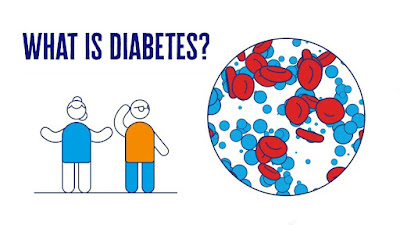Understanding Diabetes
Diabetes is a chronic health condition that occurs when the body cannot properly regulate blood sugar levels. The disease affects millions of people worldwide and is characterized by high blood sugar levels, which can lead to serious complications over time.
There are two main types of diabetes: type 1 and type 2. Type 1 diabetes occurs when the body's immune system attacks and destroys the cells in the pancreas that produce insulin. Insulin is a hormone that helps regulate blood sugar levels, and without it, the body cannot properly use glucose for energy. Type 2 diabetes occurs when the body becomes resistant to insulin or does not produce enough of it. This type of diabetes is often related to lifestyle factors, such as poor diet and lack of exercise.
Symptoms of diabetes can include frequent urination, excessive thirst, blurred vision, fatigue, and slow-healing wounds. If left untreated, diabetes can lead to serious complications, including nerve damage, kidney damage, and heart disease.
Treatment for diabetes typically involves lifestyle changes, such as a healthy diet and regular exercise, as well as medication and insulin therapy. Regular monitoring of blood sugar levels is also essential for managing the condition.
Prevention of diabetes involves maintaining a healthy weight, eating a balanced diet, and getting regular exercise. It's also important to get regular checkups and monitor blood sugar levels if you have a family history of diabetes or other risk factors for the disease.
In conclusion, diabetes is a serious health condition that requires ongoing management and care. With proper treatment and lifestyle changes, however, people with diabetes can live long, healthy lives.
Diabetes: Main Signs.
Diabetes is a metabolic disorder that affects millions of people around the world. It occurs when the body is unable to produce or properly use insulin, a hormone that regulates blood sugar levels. When left untreated, diabetes can lead to serious health complications such as kidney disease, heart disease, and nerve damage. Early detection and treatment are key to managing diabetes and preventing complications.Here are the three main signs of diabetes:
1: Frequent urination: One of the most common signs of diabetes is frequent urination, which is often accompanied by excessive thirst. When blood sugar levels are high, the kidneys have to work harder to filter the sugar out of the blood. This can cause you to urinate more often and become dehydrated, leading to increased thirst.2: Increased hunger: Another common sign of diabetes is increased hunger, even after eating. When the body is unable to use insulin properly, glucose (sugar) cannot enter the cells to provide energy, which can make you feel hungry all the time. This can lead to overeating and weight gain.
3: Fatigue: Feeling tired and sluggish is also a common sign of diabetes. When blood sugar levels are high, the body may not be able to convert glucose into energy, which can leave you feeling fatigued and weak. This can affect your ability to concentrate and perform daily tasks.
If you experience any of these symptoms, it is important to speak with your healthcare provider. They can perform a blood test to check your blood sugar levels and determine if you have diabetes. Early detection and treatment can help you manage your condition and prevent complications.
Diabetes-Friendly Foods
Diabetes is a chronic condition that affects the way the body uses glucose or sugar. People with diabetes need to manage their blood sugar levels to avoid health complications. Diet plays a crucial role in managing diabetes, and certain foods can help regulate blood sugar levels. Here are some foods that are good for diabetes:1: Non-Starchy Vegetables: Non-starchy vegetables such as leafy greens, broccoli, cauliflower, and peppers are low in calories and carbohydrates, making them ideal for people with diabetes. They are also rich in vitamins, minerals, and fiber, which can help regulate blood sugar levels.
2: Whole Grains: Whole grains such as brown rice, quinoa, and whole wheat bread are rich in fiber and can help regulate blood sugar levels. They also contain vitamins, minerals, and antioxidants, which can reduce the risk of heart disease, a common complication of diabetes.
3: Fatty Fish: Fatty fish such as salmon, tuna, and mackerel are rich in omega-3 fatty acids, which can reduce inflammation and lower the risk of heart disease. People with diabetes are at a higher risk of heart disease, so including fatty fish in their diet can be beneficial.
4: Nuts and Seeds: Nuts and seeds such as almonds, walnuts, chia seeds, and flax seeds are rich in healthy fats, protein, and fiber, which can help regulate blood sugar levels. They are also a good source of vitamins and minerals.5: Low-Fat Dairy: Low-fat dairy products such as milk, yogurt, and cheese are rich in calcium, vitamin D, and protein, which can help maintain strong bones and muscles. They also contain carbohydrates, which can help regulate blood sugar levels.
It's essential to note that people with diabetes should avoid foods that are high in sugar, such as candy, soda, and baked goods. They should also limit their intake of processed foods, which can contain hidden sugars and carbohydrates. A registered dietitian can help create a personalized meal plan based on individual needs and preferences.











0 टिप्पणियाँ